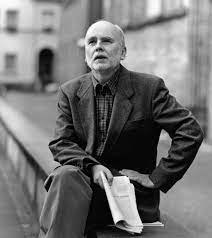
After reading Zbigniew Herbert’s small book Mr. Cogito, I was hungry for more. On the web, I found this disturbingly beautiful (and beautifully disturbing) Herbert poem about a Greek myth and wanted to share it. This translation comes from Alissa Valles in 2007. The good news? It led me to The Collected Poems. Riches lead to riches.
Apollo and Marsyas
The real duel of Apollo
with Marsyas
(absolute ear
versus immense range)
takes place in the evening
when as we already know
the judges
have awarded victory to the god
bound tight to a tree
meticulously stripped of his skin
Marsyas
howls
before the howl reaches his tall ears
he reposes in the shadow of that howl
shaken by a shudder of disgust
Apollo is cleaning his instrument
only seemingly
is the voice of Marsyas
monotonous
and composed of a single vowel
A
in reality
Marsyas relates
the inexhaustible wealth
of his body
bald mountains of liver
white ravines of aliment
rustling forests of lung
sweet hillocks of muscle
joints bile blood and shudders
the wintry wind of bone
over the salt of memory
shaken by a shudder of disgust
Apollo is cleaning his instrument
now to the chorus
is joined the backbone of Marsyas
in principle the same A
only deeper with the addition of rust
this is already beyond the endurance
of the god with nerves of artificial fibre
along a gravel path
hedged with box
the victor departs
wondering
whether out of Marsyas’ howling
there will not some day arise
a new kind
of art—let us say—concrete
suddenly
at his feet
falls a petrified nightingale
he looks back
and sees
that the hair of the tree to which Marsyas was fastened
is white
completely

